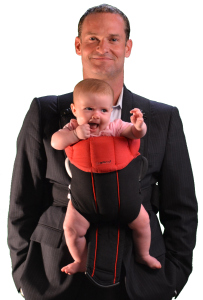
Welcome to my very first guest blog post! I met Dr. Daniel Singley here in San Diego where he works with men entering fatherhood. Below is his bio and website. Please share this post with anyone you think may benefit from it.
Dr. Daniel Singley is a board certified psychologist specializing in men’s issues and the transition to fatherhood. He founded The Center for Men’s Excellence to enable men, women, and couples to more effectively manage areas of concern by learning and applying concrete psychological techniques in their lives. You can learn more about Dr. Singley and his practice at www.menexcel.com.
Daddy 2.0: This is Not Your Father’s Fatherhood
Dads in the U.S. these days are expected be much more involved with their infants and babies than ever before. Although traditionally, both men and women have been socialized to see the perinatal period spanning from conception through a year or so postpartum as basically being “mothering,” new fathers are now taking on a greater share of the responsibility for childcare and domestic duties during this time. From a historical perspective, this rise is a natural extension of the women’s liberation movement which resulted in a significant increase in the number of women and moms in the workplace. This fairly recent phenomenon can present some challenges because the traditional male gender “box” discourages men from “feminine” traits such as being emotionally open or nurturing. Thankfully – as evidenced by the father-centric “manvertising” in the commercials during the 2015 Super Bowl (for example, Dove’s “Real Strength” ad highlighting the need for dads to show their kids they care) – there’s a growing appreciation for the unique ways that fathers provide their children with something that research is showing has farther-reaching consequences than any toy or material resource: A close relationship with their dads.
A growing body of research shows that babies whose fathers are highly involved with them during their first year of life tend to experience considerable benefits in their cognitive functioning, school readiness, social skills, and emotional regulation down the line. However, in large part because the current generation of new parents is likely to have had Baby Boomer parents with a more traditionally-gendered division of labor (See: Mom stays home, dad works and only notices the kid once s/he can throw things), they often struggle with exactly what dad’s “involvement” with a young child should look like. Importantly, it’s both moms and dads receive this ongoing socialization about parenting roles, and I have seen a growing number of couples in my practice who struggle with reconciling what they both agree dad should be doing with his baby and/or partner, but isn’t. On the other hand, some moms and dads alike are flat out confused about what they’re supposed to be doing. Largely as a response to this growing trend, the U.S. Department of Health and Human Services published a report titled “The Importance of Fathers in The Healthy Development of Children” (Rosenberg & Wilcox, 2006). In that document, the authors synthesized a slew of fatherhood involvement research down to the following key elements of fatherhood:
- Fostering a positive relationship with the child’s mother
- Spending time with the child
- Nurturing the child
- Disciplining appropriately
- Serving as a guide to the outside world
- Protecting and providing
- Being a role model
I actually have a handout with these items on it, and will commonly give it to new parents with the “homework” to review it at the end of each day with an eye toward whether dad covered all of his bases. If so – great. If not – identify concrete behaviors in the lacking areas and hit them off tomorrow.
Another key element of how involved new dads are with their babies has to do with confidence. It stands to reason that if a dad has a very low expectation that he’ll be successful with some aspect of child care (e.g., bathing his newborn), that he’s unlikely to even try it. Conversely – if he’s pretty confident that his swaddle game is strong, then he’s more likely to step in and take point in swaddling the newborn to go down for a nap – pretty straightforward. However, one factor which tends to strongly inform the dad’s sense of his own “daddy self-efficacy” is his partner’s “other efficacy” or confidence in his ability care for his infant. The partner’s confidence – or lack thereof – can be conveyed to dad in a variety of ways ranging from simply not involving him in day-to-day childcare to grumbling while re-doing the diapering job he just did, to outright criticism. New parenting is often said to be a “learn on the job” affair, so it’s critically important that moms work to involve and meet dad where he is and express support rather than letting rigidity or anxiety-driven gatekeeping reduce his involvement.
While there are of course some universal basic needs like feeding, sleep, and protection from the elements – there is no one single best way to parent infants and children apart from engaging with them in a way that helps parents to be attuned to their needs and internal states. However, because the parenting of babies is generally thought of as “mothering,” moms and dads alike tend not to have a clear model of what dads commonly offer their kids which is uniquely “fathering.” For example, years of research shows that mothers tend to spend a higher percentage of their overall time with their babies, whereas fathers usually spend a higher proportion of their time with babies engaged in play activities (as opposed to direct caretaking behavior). By playing with dad, their children learn how to regulate their feelings and behavior. For example, rough-and-tumble play with dad can a be a way in which children learn about appropriately managing aggressive interactions and physical contact without losing control of their emotions. The graph below emphasizes another means through which fathers’ “jazzed up” involvement with their babies may relate to improvements in the baby’s subsequent mental health functioning:
Imagine dad tossing his baby into the air three times in rapid succession, then putting the baby down to check his phone for a couple of minutes before starting all over again. The dad’s behavior causes a spike in the child’s central nervous system hormones followed by some time in which s/he has the experience of down-regulating him/her-self back down to a calm state. On the other hand, mom is more likely to engage in more sustained, soothing, lower-intensity activities (think: slowly rocking the baby and singing “The Wheels On The Bus”). If you take this basic idea and apply it broadly over the child’s early years, you can see how dads’ more active interactive styles can directly translate into the child learning to self-regulate high-intensity emotional states. Moms and dads alike tend to really appreciate this example of how dads interacting differently than moms do with their kids can actually be really healthy.
The take-home point here is that the majority of dads these days are looking to be highly involved throughout the pregnancy, birth, and the “fourth” trimester – but often run into some difficulty with exactly how to do so.
A few suggestions to keep in mind along these lines are include:
Be proactive about keeping the relationship strong. Even from a very early age, the quality of the parents’ relationship has a profound impact on the child’s health and well-being. I recommend that all couples meet to have weekly “State of the Union” check-ins in order to connect about how they’re doing: The good, bad, and the ugly. Most men would rather hit themselves in the face with a brick than initiate this kind of meeting, but it’s one of the best ways to minimize the typical dip in relationship satisfaction after the birth of a baby.
Give dads alone time with baby as soon as possible. Nothing provides better proof that he’s a competent father than direct evidence showing that, in fact, the baby didn’t explode after 30 minutes in his care. My motto is that dads can and should do everything for their babies except nursing because, well, we’re hardware-challenged on that front. However, the more that dads bathe, soothe, swaddle, burp, diaper, dress, and generally care for their babies, the faster they will feel confident in their new role and connected with their baby. I recommend that couples take a step-wise approach in which dads take incrementally more time and responsibility in an ongoing way. So dad might start by taking the kiddo for 20 minutes while mom’s in the shower, then go for a solo walk with the stroller, drive with the baby to get some takeout, go run some errands with the kiddo in tow, etc.
Men have perinatal mental health issues, too. A variety of studies show that over 10% of men experience significant symptoms of depression during the transition to fatherhood, and the number one risk factor is having a partner experiencing postpartum depression (50% of new dads experience depression if their partner is depressed). However, at a time when the dads have repeatedly been told that their main jobs are to earn a living and to support mom, they rarely feel entitled to owning up to having common difficulties like stress, anxiety, isolation, anger, jealousy, guilt, etc. To further confuse matters, men commonly experience a type of male-specific “masked depression” in which they appear irritable, angry, withdrawn, and/or engage in substance use – but they aren’t showing the typical signs of depression such as crying, feeling hopeless, or seeming sad. There are a variety of well-researched, evidence-based treatments for moms and dads experiencing perinatal mental health concerns, so rather than hope “it” goes away, be proactive and talk with an expert who can give you the tools to manage difficulties and thrive in this new chapter of your life.
One final point: Dads, you can’t babysit your own kiddo. That’s called, “fathering.”









Leave a Reply